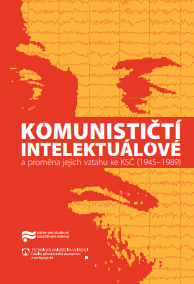Zdeněk Nejedlý, komunismus a problém „zrady vzdělanců“
Zdeněk Nejedlý, communism and the case of “betrayal of scholars”
Author(s): Jiří Křesťan
Subject(s): Political history, Social history, Recent History (1900 till today), History of Education, WW II and following years (1940 - 1949), Post-War period (1950 - 1989), History of Communism
Published by: Ústav pro studium totalitních režimů
Keywords: Czechoslovakia; Zdeněk Nejedlý; communist party; intellectuals; 20th century; postwar period; education; USSR;
Summary/Abstract: The case of Zdeněk Nejedlý is a proof that inclination of intellectuals and artists to the communist party was not an uniform and simple process that could be expressed by a simple slogan like “betrayal of scholars”. Since the 1930s was the communist party able to intrigue a wider spectrum of citizens and the Second World War put a stress on the words about “defence of the nation” and united communists and non-communists. Communists gained a lot of credit and respect during the war against fascism and Soviet Union also benefited from this fact. Moreover the Stalinism found another boost in Czech countries. The plebeian democracy, inclination to equalitarianism, respect for authority, looking for foreign support and relying upon it, establishing national unity through repudiation of “enemies” – all these factors existed in Czech political thinking and vibrated with the voices of Stalinist bolshevism. The Nejedlý 1946 idea describing the communists as the followers of the best traditions of the Czech nation came out of his older thoughts about the necessity of socialist outcome of the course of the Czech history. In 1920s and 1930s Nejedlý maintained contacts with various socialist movements. He had objections towards the communist party and did not become its member until 1939 in Moscow. Until the fifties he described the communist program as a climax of the Masaryks program. The Nejedlý’s admiration of 19th century classics, of Palacký, Havlíček or Masaryk and acceptance of interwar avantgarde were to a certain extent an obstruction to rampaging radicals attempting to repudiate pre-revolution culture. He opposed the sovietisation of education in Czechoslovakia and prior to the passing of the education reform in 1953 he had to be dismissed from the office of the minister of education.
Book: Komunističtí intelektuálové a proměna jejich vztahu ke KSČ (1945-1989)
- Page Range: 76-88
- Page Count: 13
- Publication Year: 2013
- Language: Czech
- Content File-PDF

